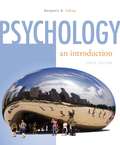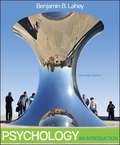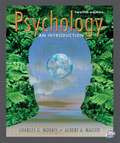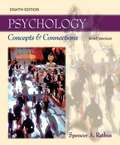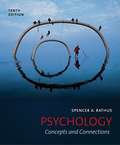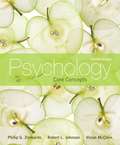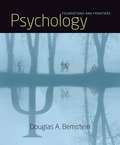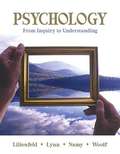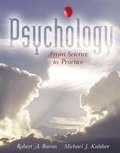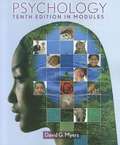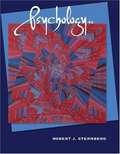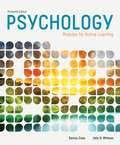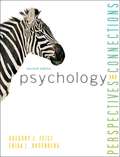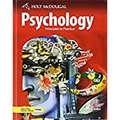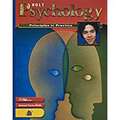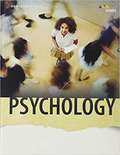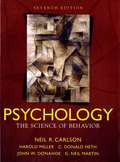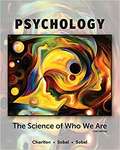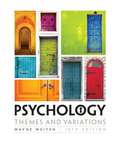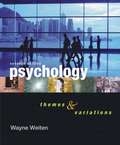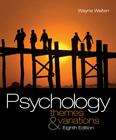- Table View
- List View
Psychology: An Introduction (10th edition)
by Benjamin B. LaheyThis introductory undergraduate psychology text covers central concepts in a reader-friendly writing style and a highly visual format, with color photos, illustrations, cartoons, medical images, and multiple-page visual reviews of brain structures, the sense organs, stage theories of development, and theories of motivation, emotion, and personality. Pedagogical features include chapter outlines and prologues, nested review and summary features, and close attention to visual cues such as typeface, size, and color, as well as clear verbal cues to alert readers to new information. An introductory chapter describes study skills, defines critical thinking, and gives advice especially for first-generation college students. Coverage progresses from foundations through awareness, learning and cognition, developmental psychology, the self, health and adjustment, and social context. This tenth edition offers streamlined content and a slightly shorter book, with a new chapter on the interplay of nature and nurture. Information on diversity and culture, sex differences, gender roles, and sexuality is integrated throughout the text. Lahey is affiliated with the University of Chicago.
Psychology: An Introduction (11th Edition)
by Benjamin B. LaheyWith this textbook, Lahey (U. of Chicago) aims to acquaint students with the science of psychology in a clear way and emphasize meaningful learning and remembering. This edition incorporates new information on biological foundations of behavior and the interplay of nature and nurture; discussion of videogames and visual perception, complementary colors, kinesthetic receptors, phantom pain, and pheromones and sexual attraction; more on states of consciousness, including multitasking, selective attention, mindless reading, and shift work; and discussion of memory, deep processing, and sleep. It also addresses creative problem solving; breastfeeding and children's intelligence; new topics in developmental psychology, including adjustment to cochlear implants, the importance of the prenatal environment, individual variation, and the impact of grandparents, day care, and divorce; motivation and emotion; personality and future academic success, physical health, and longevity; stress, depression, and health, including the link between excessive alcohol use, academic failure, and injuries and death; definitions and cultural and scientific influences related to abnormal behavior; and new research and coverage of social networking, individual brainstorming, conformity, and discrimination. Annotation ©2011 Book News, Inc. , Portland, OR (booknews. com)
Psychology: An Introduction (12th Edition)
by Charles G. Morris Albert A. MaistoA venerable textbook for introductory college or high school psychology courses.
Psychology: An Introduction (9th Edition)
by Benjamin B. LaheyThis introductory undergraduate psychology text covers central concepts in a reader-friendly writing style and a highly visual format, with color photos, illustrations, cartoons, medical images, and multiple-page visual reviews of brain structures, the sense organs, stage theories of development, and theories of motivation, emotion, and personality. Pedagogical features include chapter outlines and prologues, nested review and summary features, and close attention to visual cues such as typeface, size, and color, as well as clear verbal cues to alert readers to new information. An introductory chapter describes study skills, defines critical thinking, and gives advice especially for first-generation college students. Coverage progresses from foundations through awareness, learning and cognition, developmental psychology, the self, health and adjustment, and social context. This tenth edition offers streamlined content and a slightly shorter book, with a new chapter on the interplay of nature and nurture. Information on diversity and culture, sex differences, gender roles, and sexuality is integrated throughout the text. Lahey is affiliated with the University of Chicago. Annotation ©2009 Book News, Inc. , Portland, OR (booknews. com)
Psychology: Concepts And Connections, Brief Version
by Spencer A. RathusThe book explains classic theories and the latest discoveries in a clear, accessible style intended to reach out to students-without sacrificing Rathus’ commitment to showing psychology as the rigorous science that it is. Throughout the text, you’ll find an emphasis on diversity and expanded coverage of the evolutionary perspective, plus numerous references to the timeliest research available. And, the text’s proven active learning system, PQ4R (Preview, Question, Read, Reflect, Review, and Recite), incorporated into every chapter, seamlessly integrates reading and studying. In addition, Rathus’ text features the most integrated multi-platform media package available, the full Web site that features Self-Study Assessments, Video Connections, Mobile Media and interactive versions of features from the text-all tightly connected to the text itself to give students the a powerful, comprehensive introduction to psychology.
Psychology: Concepts and Applications
by Jeffrey S. NevidPSYCHOLOGY: CONCEPTS AND APPLICATIONS, 3rd Edition, uses a unique, proven learning system that makes it easier and more enjoyable for you to learn what you need to learn'and succeed in your psychology course. Author Jeff Nevid provides a broad view of psychology that includes history, major theories, research methods, and research findings as well as applications of contemporary research to the challenges you face in everyday life. The text's modular format organizes each chapter into manageable units that help you focus on one topic at a time within the context of a larger chapter structure. Concept signaling'a technique that highlights key concepts in the text margins'helps you extract the main points from the narrative. As you read, key concepts are reinforced through additional features, such as Concept Charts, Module Reviews, and Visual Overviews, which have proven to significantly improve students' retention of material and performance in class.
Psychology: Concepts and Connections (10th Edition)
by Spencer A. RathusRich in reader-friendly features and up-to-the-minute research, Spencer Rathus's Tenth Edition of PSYCHOLOGY: CONCEPTS AND CONNECTIONS, MEDIA & RESEARCH UPDATE EDITION makes your students' introduction to psychology a meaningful, personal experience. Rathus connects the core concepts of psychology to the events and issues students encounter every day. The book explains classic theories and the latest discoveries in a clear, accessible style intended to reach out to students-without sacrificing Rathus's commitment to showing psychology as the rigorous science that it is. Throughout the text, you'll find an emphasis on diversity and expanded coverage of the evolutionary perspective, plus numerous references to the timeliest research available. And, the text's proven active learning system, PQ4R (Preview, Question, Read, Reflect, Review, and Recite), incorporated into every chapter, seamlessly integrates reading and studying. In addition, Rathus's text features the most integrated multi-platform media package available, the full Web site that features Self-Study Assessments, Video Connections, Mobile Media and interactive versions of features from the text-all tightly connected to the text itself to give students the a powerful, comprehensive introduction to psychology.
Psychology: Core Concepts
by Philip G. Zimbardo Robert L. Johnson Vivian MccannWhere great science meets great teaching. At just fourteen chapters, Psychology: Core Concepts provides rich coverage of the foundational topics taught in most introductory courses. Psychology: Core Concepts focuses on a manageable number of core concepts (usually three to five) in each chapter, allowing students to attain a deeper level of understanding of the material. Learning is reinforced through focused application and critical thinking activities, and connections between concepts are drawn across chapters to help students see the big picture of psychology as a whole. The 7th edition features an enhanced critical thinking emphasis, with new chapter-opening "Problems" and new end-of-chapter critical thinking applications that promote active learning.
Psychology: Foundations and Frontiers
by Douglas A. BernsteinPSYCHOLOGY: FOUNDATIONS AND FRONTIERS introduces readers to the fascinating world of psychology by presenting important findings from established and current research, emphasizing the many ways psychological theory and research results are being applied to benefit human welfare, and providing helpful visuals and learning tools. An integrated pedagogical study system helps readers master the material step by step. Try This activities illustrate psychological principles or phenomena by providing numerous opportunities for readers to learn by doing. Other features include Linkages diagrams and sections that show readers how topics in psychology are interrelated, Thinking Critically sections that apply a five-question approach to various topics, and Focus on Research sections to help readers think objectively about research questions and results.
Psychology: From Inquiry to Understanding
by Scott O. Lilienfeld Nancy J. Woolf Laura L. Namy Steven Jay LynnLilienfeld provides the framework that students need to go from inquiry to understanding. By encouraging students to question, and teaching students how to test their assumptions, Lilienfeld motivates students to use scientific thinking skills to better understand the complex world of psychology.
Psychology: From Science to Practice
by Robert A. Baron Michael J. KalsherWith a strong emphasis on application-- without neglecting research and science-- this text focuses on helping students use the findings and knowledge of psychology in their own lives and careers. As the only introductory psychology text written by authors with extensive business experience, this book seeks the ideal balance between psychology' s "practical "and "scientific "sides. It highlights psychology' s scientific nature while simultaneously emphasizing its practical value-- how students can actually use and apply the material they read on the job and outside of the classroom. "Psychology: From Science to Practice" emphasizes three key goals: Make it clear to students how they can actually use the findings and knowledge of psychology in their own lives and careers. Present psychology as a science. Discuss the major findings of psychology without overwhelming students with too much detail.
Psychology: In Modules (Tenth Edition)
by David G. MyersThis modules-based version of Myers' Psychology tenth edition breaks down the book's 16 chapters into 54 short modules. The condensed text allows students to better grasp and explore psychological concepts. It also makes for more flexibility in teaching, as cross-references to other chapters have been replaced with brief explanations.
Psychology: In Search of the Human Mind (4th Edition)
by Robert J. SternbergSternberg (psychology, Yale University) emphasizes the theme of unity in psychological sciences in this fourth edition. This edition has been edited for readability and interest, and includes new boxed features on how psychologists from different disciplines would treat the same condition. Also new are expanded quizzes, critical thinking questions, and chapter summaries. The CD- ROM contains animations, activities, and videos. Annotation (c)2003 Book News, Inc., Portland, OR (booknews.com)
Psychology: Modules For Active Learning, Thirteenth Edition
by Dennis Coon John O. MittererPSYCHOLOGY: MODULES FOR ACTIVE LEARNING combines the highly effective SQ4R (Survey, Question, Read, Recite, Reflect, Review) active learning system, an engaging style, appealing visuals, and detailed coverage of core topics and cutting-edge research in one remarkable, comprehensive text. Fully updated, the thirteenth edition of this best-selling book includes new and revised content, extensive special features, and integrated learning tools. While the book provides a thorough introduction to the study of psychology, its modular design and emphasis on how psychology relates to everyday life make it easy for readers to explore, enjoy, and ultimately master a wide variety of topics.
Psychology: Perspectives and Connections (2nd Edition)
by Gregory Feist Erika RosenbergIn psychology, not everything is black and white. "Psychology: Perspectives & Connections 2e " dares students to challenge their own assumptions, explore research and to not believe everything they think. The over-riding goal of "Psychology: Perspectives & Connections 2e " is to align what excites us as researchers and perpetual students of psychology with todays introductory psychology student. Feist and Rosenbergs aim is to help students understand that psychology, and much of the world around them, is more fascinating--and likely more intricate and interdependent-- than they think. Its not just black and white. And, with Connect Psychology and its adaptive learning system, students can better understand what they know and master what they dont know. Connect with science. Connect with students. Connect with Feist and Rosenbergs "Psychology 2e. "
Psychology: Principles in Practice
by Spencer A. RathusNever HIGHLIGHT a Book Again! Virtually all testable terms, concepts, persons, places, and events are included.look no further for study resources or reference material. Cram101 Textbook Outlines gives all of the outlines, highlights, notes, and practice-tests for your textbook. Only Cram101 is Textbook Specific. Cram101 is NOT the Textbook.
Psychology: Principles in Practice
by Spencer A. RathusEvery day, psychologists study a fascinating topic--people. Why do they do this? To learn why people act and think the way they do.
Psychology: Principles in Practice
by Spencer A. RathusOne needs to develop a variety of critical thinking skills to fully grasp the range of concepts and methods used in the study of psychology and this book guides one to achieve that.
Psychology: Principles in Practice
by Spencer RathusPsychology: Principles in Practice by Spencer Rathus.
Psychology: The Science of Behavior (7th edition)
by Neil R. Carlson Harold Miller C. Donald Heth John W. Donahoe G. Neil MartinThis, a rigorous biological and evolutionary approach to introductory psychology text, presents psychological behavior in the context of its adaptive significance. The Seventh Edition combines a scholarly survey of research with real-world applications of research results to problems that confront us today. The authors apply the discovery method to take students inside the research process to foster a critical understanding of the logic and significance of empirical findings.
Psychology: The Science of Who We Are
by Fountainhead PressPsychology: The Science of Who We Are presents an overview of the major ideas and themes of modern psychology studied in introductory and general psychology courses. With an emphasis on real-life applications of psychological theories and concepts, Shawn Charlton, Susan Sobel, and Ken Sobel offer not only the structure and history of psychology but also explain such concepts through relatable examples and common experiences. As students study this text, they will learn about the tools of modern psychology, the role of biological systems in shaping behavior, how the brain makes sense of the world, how they change and mature throughout their lifespans, how behavior affects their understanding of their environments, what creates personality, the differences between thinking and intelligence, what defines normal and abnormal behaviors, how to treat abnormal behaviors, and the dynamics of social environments. Students studying this text will build a foundation for further studies in psychology and for better understanding themselves and others.
Psychology: Themes and Variations
by Wayne WeitenA more concise version of the introductory psychology text offering thorough coverage of the major theories (and controversies) in the field today. The focus is on ideas rather than facts, integrating research and application in the areas of biological behavior concepts, sensation and perception, consciousness, conditioning, memory, language and thought, intelligence and psychological testing, emotion, human development, personality theory, stress, psychological disorders, psychotherapy, and social behavior. Includes very jazzy color photographs and illustrations. Paper edition (unseen), $48.75. Annotation c. by Book News, Inc., Portland, Or.
Psychology: Themes and Variations
by Wayne WeitenA more concise version of the introductory psychology text offering thorough coverage of the major theories (and controversies) in the field today. The focus is on ideas rather than facts, integrating research and application in the areas of biological behavior concepts, sensation and perception, consciousness, conditioning, memory, language and thought, intelligence and psychological testing, emotion, human development, personality theory, stress, psychological disorders, psychotherapy, and social behavior. Includes very jazzy color photographs and illustrations. Paper edition (unseen), $48. 75. Annotation c. by Book News, Inc. , Portland, Or.
